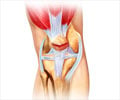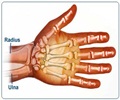A study is being conducted by researchers at the University of Rhode Island to develop improved prosthetic legs that could prevent amputees from tripping.
A study is being conducted by researchers at the University of Rhode Island to develop improved prosthetic legs that could prevent amputees from tripping.
The study is aimed at improving the safety of prosthetic legs by developing a reliable and responsive stumble detection system.The researchers conducted the study on six clients of Nunnery Orthotic and Prosthetic Technologies, who were hooked up to dozens of electrodes, wore shoes containing 99 pressure sensors, and had 40 light-reflective markers on their body, which were tracked by eight cameras in a room to collect the data necessary for the research.
"When we become unbalanced, our neural system reacts quickly and sends a signal to help us recover. Our challenge is to see if we can detect these neural reactions fast enough to activate a mechanism in a patient's prosthetic leg to stabilize them before they fall," said He (Helen) Huang, assistant professor of biomedical engineering at URI.
During the experimental phase of the study, Huang is collecting data from able-bodied individuals and those using prosthetic legs to determine what kind of physiological signals can be detected for use in developing a stumble detection system.
Having analysed the data, she finally hopes to develop an algorithm that can be used in computer-controlled artificial limbs to provide active stumble recovery.
"If we can detect the stumble reaction fast enough, then there may be time to react to it. Hopefully we can develop a system that can mimic the normal human reaction to stumbling," said Huang.
Advertisement
"We need to give a lot of credit to the patients involved in this study as they are allowing us the opportunity to collect unprecedented data related to stumble and recovery reactions in amputees. We hope to utilize this data to have an innovative impact on the future of above knee amputee prosthetics needs," said Michael Nunnery, owner of Nunnery Orthotic and Prosthetic Technologies, Inc., one of the partners in the research project.
Advertisement
RAS












